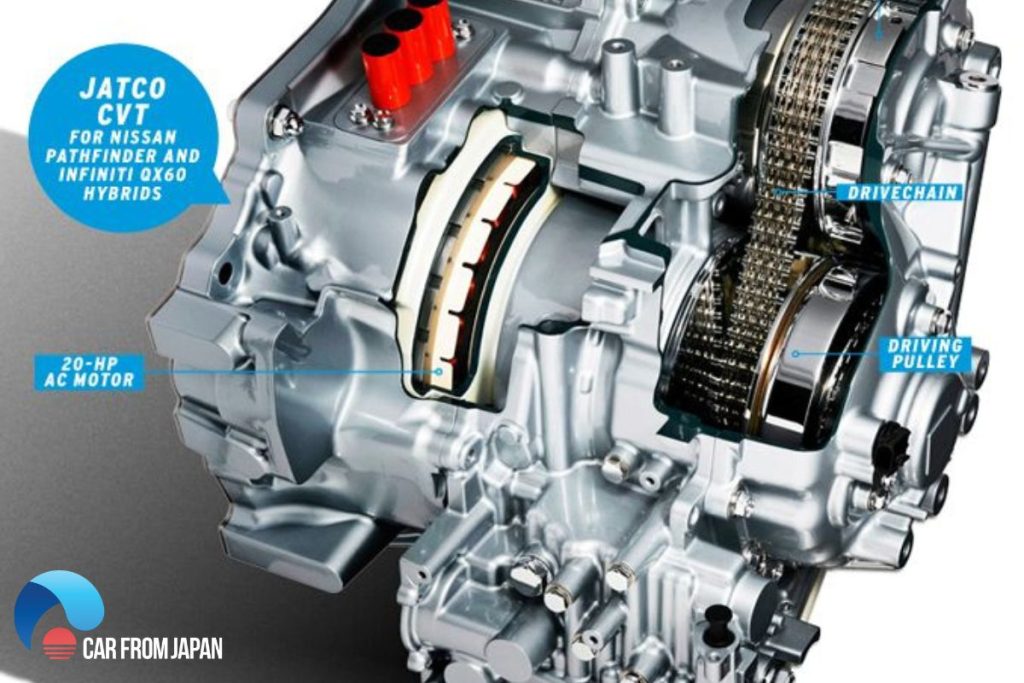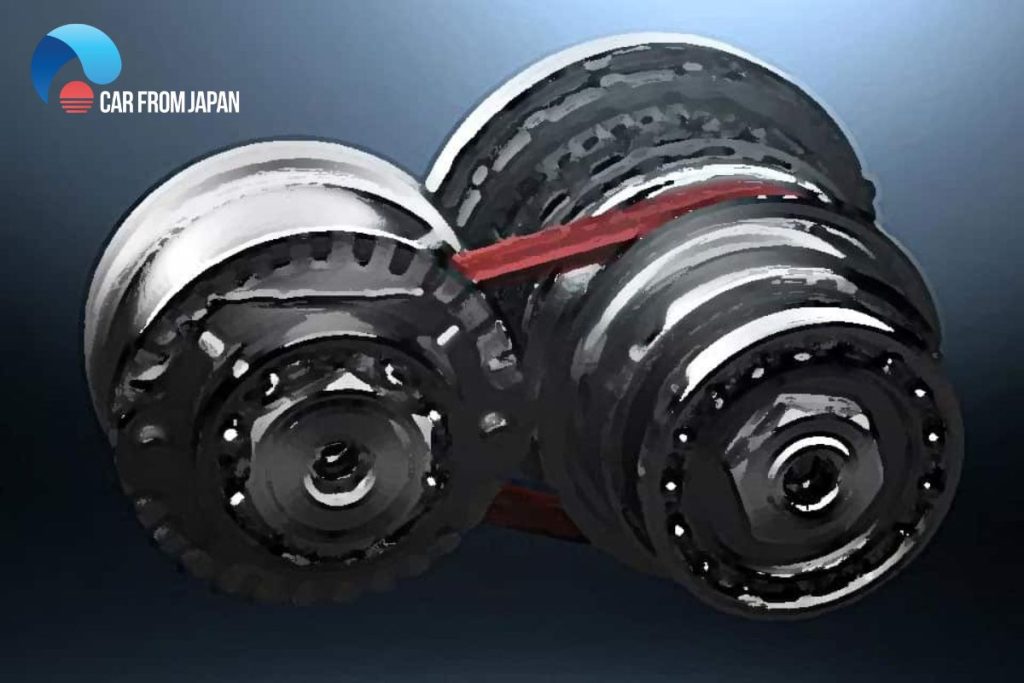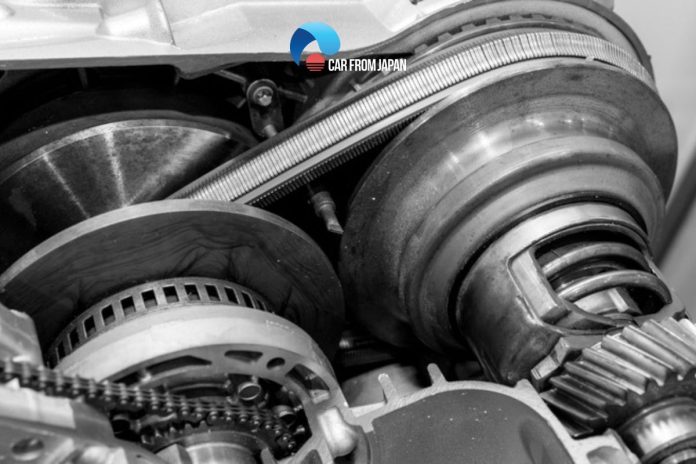Nissan CVT has been a source of frustration for many Nissan owners. While CVTs were initially known as a more efficient and reliable alternative to traditional automatic transmissions, Nissan’s CVT has had a history of problems that have caused headaches for drivers. What happened to these Nissan models? In this article, we’ll explore some of the most common Nissan CVT transmission problems and what you can do to prolong its lifespan.
Contents
History Of Nissan CVT Transmissions
Before going deep into the problem, let’s talk about an introduction to the Nissan CVT. It’s not particularly new when it comes to CVT technology. CVT transmission concept was initially introduced during the 1940s and 1950s, however, Nissan first started incorporating CVTs in their vehicles in the early 1990s when automakers released the 1992 Nissan March.
Within a few years, since Nissan integrated CVT transmission in its vehicles, Nissan shifted to including CVTs in almost all their cars like Nissan Altima, Nissan Pathfinder, Nissan Rogues, Nissan Sentra, and Nissan Versus. It was such a good time for Nissan.
At that time Nissan was one of the first pioneers in equipping CTVs in vehicles. And speaking frankly, we can’t deny the benefits of CVT transmissions because using CVTs can significantly improve the fuel efficiency of the car. And here are some of the outstanding features of Nissan CVT transmissions:
- Low maintenance: Compared to traditional automatic transmissions, CVT transmissions have fewer moving parts which means that maintenance will not be required frequently. Nissan CVTs have been designed to last for many years and proved to have a longer lifespan.
- Fuel efficiency: Like other CVT transmissions, Nissan CVTs were also known for having better fuel economy and reducing emissions because this transmission can keep your engine operating at the most efficient RPM range.
We must say that it was a success for Nissan since they introduced the cars with CVTs, however, it wouldn’t be long before some problems started appearing in the Nissan cars.

Nissan CVT Transmission Recall
These problems have caused great impacts on the driver experience, not only that, but they also pose a danger to the driver during use. According to the information we have, to ensure the safety of drivers, several Nissan models have been recalled to handle errors:
- 2012-2017 Sentra: In 2018, Nissan issued a recall for certain 2012-2017 Sentra sedans equipped with CVT transmissions. The recall was issued due to a defect that could cause the transmission to fail, which could result in a loss of power and increase the risk of a crash.
- 2013-2014 Pathfinder: In 2014, Nissan issued a recall for certain 2013-2014 Pathfinder SUVs equipped with CVT transmissions. The recall was issued due to a defect that could cause the transmission to fail, which could result in a loss of power and increase the risk of a crash.
- 2013-2016 Altima: In 2016, Nissan issued a recall for certain 2013-2016 Altima sedans equipped with CVT transmissions. The recall was issued due to a defect that could cause the transmission to fail, which could result in a loss of power and increase the risk of a crash.
- 2015 Murano: In 2016, Nissan issued a recall for certain 2015 Murano SUVs equipped with CVT transmissions. The recall was issued due to a defect that could cause the transmission to fail, which could result in a loss of power and increase the risk of a crash.
If your Nissan vehicle is subject to a recall related to the CVT transmission, it’s important to contact your local Nissan dealership as soon as possible to schedule a free repair. It’s also important to stay up-to-date with any future recalls that may be issued related to the CVT transmission or other safety issues.
Watch the video to know Why Nissan CVT fails:
What did Nissan Do To Respond To CVT Transmission Problems?
Nissan has taken several steps to address the CVT transmission problems that have been reported by some customers. Here are a few of the actions that Nissan has taken:
- Extended warranty: Nissan has extended the warranty on certain vehicles equipped with CVT transmissions to 10 years/120,000 miles, whichever comes first. This extended warranty covers certain repairs related to CVT transmission problems, including transmission replacement if necessary.

- Technical Service Bulletins: Nissan has issued several Technical Service Bulletins (TSBs) related to CVT transmission problems, which guide dealerships and mechanics on how to diagnose and repair specific issues.
- Improved design: Nissan has made improvements to the design of its CVT transmissions in recent years, including the use of stronger materials and improved cooling systems.
- Settlements and buybacks: In some cases, Nissan has offered settlements or buybacks to customers who have experienced significant problems with their CVT transmissions.
- Customer assistance: Nissan has established a customer assistance program to help customers who are experiencing issues with their CVT transmissions. This program includes a hotline for customers to call and receive assistance, as well as a website where customers can file complaints and receive information about recalls and other safety issues.
FAQs
How much does it cost to replace a Nissan CVT transmission?
The average replacement cost for a Nissan CVT transmission is between $3,500 and $8,000. Nissan’s powertrain warranty covers the transmission for 5 years or 60,000 miles. If your vehicle experiences transmission issues while under warranty, the cost of a new transmission should be included. Always check your vehicle’s warranty terms and conditions to understand what is included.
How often should I change the CVT fluid in my Nissan?
Nissan’s recommended CVT fluid change intervals vary depending on the model and year. Always consult your owner’s manual for the specific recommendations for your vehicle.
Generally, Nissan recommends changing CVT fluid every 30,000 to 60,000 miles, or sooner if you frequently drive in harsh conditions (heavy towing, extreme temperatures).
What type of CVT fluid should I use in my Nissan?
Only use Nissan-approved CVT fluid. Using the wrong type of fluid can damage your transmission. The manual says ” Use only Genuine NISSAN CVT Fluid NS-3″. CVT transmission fluids come in synthetic and conventional forms. While synthetic fluids are typically more expensive, they offer better performance and longevity.
Conclusion
Throughout this article, we’ve explored the various challenges Nissan CVT owners may face such as transmission slip, overheating transmission fluid, strange noises, or acceleration problems… By understanding these potential problems, Nissan owners can take proactive steps to mitigate risks.




In November 2024 I was coming back from Kingston in Tasmania down the Southern Outlet when the Nissan Pulsar I was driving started to make a funny noise like a “surge” in the engine. I managed to get into Hobart and rang Nissan in Hobart but no mechanic was there are 3pm on a Friday afternoon. I was told to go to MG in Campbell Street to the Service Centre.
I was very nervous but crawled around the block and because it was downhill I could get to Campbell Street.
The Service Centre said they knew nothing about my car and told me to move it as it was in the way. I explained that it would not drive properly but I managed to back it in front of the new cars at MG Motors. I waited for the RACT who tested the car and said the Speed sensor solanoid (transmission input) for the gearbox was off (Error Code P2765). I waited and finally got RACT to tow my car to my home – four hours later.
I went to Tassie Automotive and the part was ordered in November. Nothing happened – I finally went into Nissan and found it had not been ordered at all. I was promised that it would be at Tassie Automotive Monday or Tuesday this week.
On Wednesday I drove the car 50m to get the part installed. The cost was $340.00. However this had not fixed the problem as the car engine was still surging.
Today I went to Tpg as they used to do gearbox repairs for Nissans but found that even after reconditioning there were still problems and now they do not repair Nissans.
My Nissan Pulsar is 4cyl, 5 seats, Blue, Engine 31733OR, Vin MNTBAAB17A0010562, 06/2013 Manufactured.
I purchased the car in 2017 for $11,995.00 and in 2018 I drove it to S/E Qld where I lived until 2024. Then I drove it back to Tasmania and changed the Registration back with a Registration Inspection on 25/9/2024.
I have queried the cost of a 2nd hand gearbox – $4000 -$5000 and a new gearbox $10,000 – $12,000
I do not have that sort of money as I am a pensioner and not working as I am 78 years of age.
The more that I questioned why this fault had happened – the more information I gathered that this problem is endemic and many Nissans have been recalled.
I would like to have my car back but that is impossible and is only worth $500 at the wrecker.
Please can someone help me in this situation – not of my own making – but the fault of Nissan manufacture
Thank you
Patricia Gleeson
I have been driving here until the incident on the Southern Outlet on